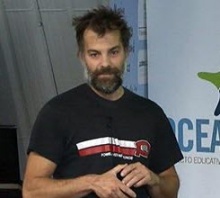Genomic divergence during speciation and its ecological consequences

!!!!CHANGEMENT DE DATE: En raison de l’Alerte Route sur Montpellier le vendredi 14/10, le SEEM de Patrik Nosil est reporté à MERCREDI 19 OCTOBRE !!!!
Patrik Nosil
University of Sheffield, UK p.nosil@sheffield.ac.uk
(Seminar in English)
Speciation can involve a transition from a few genetic loci that are resistant to gene flow to genome-wide differentiation. However, only limited data exist concerning this transition and the factors promoting it. I will present theoretical results and data from from Timema stick insects arguing that this transition to genome-wide differentiation is promoted by polygenic adaptation and mate choice, but not growth of a few genomic blocks ('islands') of differentiation. Until gene flow is near completely eliminated, some maladaptive variation is maintained within populations, which has ecological consequences for entire arthropod communities by attracting bird predators. Thus, ecological and evolutionary processes strongly interact.
Recent publications:
Soria-Carrasco, V., Z. Gompert, A.A. Comeault, T.E. Farkas, T.L. Parchman, J.S. Johnson, C.A. Buerkle, J.L. Feder, J. Bast, T. Schwander, S.P. Egan, B.J. Crespi, and P. Nosil. 2014. Stick insect genomes reveal natural selection’s role in parallel speciation. Science 344: 738-742.
Farkas, T.E., T. Mononen, A.A. Comeault, I. Hanksi, and P. Nosil. 2013. Evolution of camouflage drives rapid ecological change within an insect community. Current Biology 23: 1835-1843.
Flaxman, S.M., J.L. Feder, and P. Nosil. 2013. Genetic hitchhiking and the dynamic build up of genomic divergence during speciation with gene flow. Evolution 67: 2577-2591.
Mathieu Joron : mathieu.joron@cefe.cnrs.fr
Contact du Comité SEEM: seem@services.cnrs.fr. Contact du Labex CEMEB: gestion.cemeb@univ-montp2.fr


